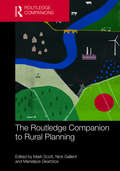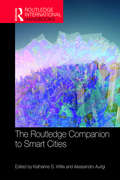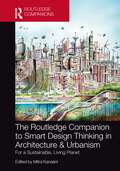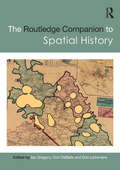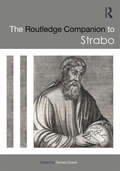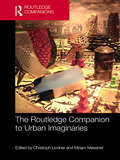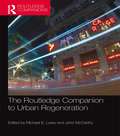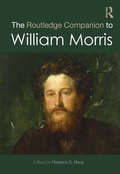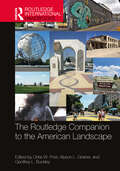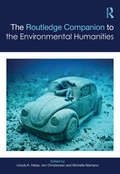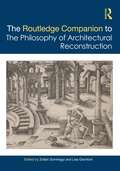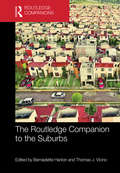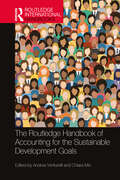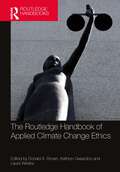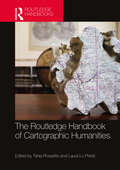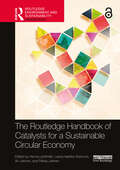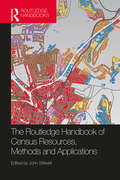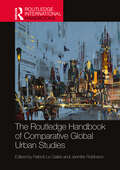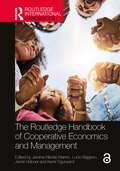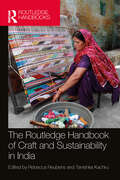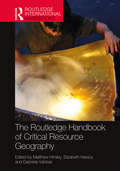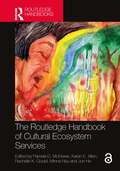- Table View
- List View
The Routledge Companion to Rural Planning
by Nick Gallent Mark Scott Menelaos GkartziosThe Routledge Companion to Rural Planning provides a critical account and state of the art review of rural planning in the early years of the twenty-first century. Looking across different international experiences – from Europe, North America and Australasia to the transition and emerging economies, including BRIC and former communist states – it aims to develop new conceptual propositions and theoretical insights, supported by detailed case studies and reviews of available data. The Companion gives coverage to emerging topics in the field and seeks to position rural planning in the broader context of global challenges: climate change, the loss of biodiversity, food and energy security, and low carbon futures. It also looks at old, established questions in new ways: at social and spatial justice, place shaping, economic development, and environmental and landscape management. Planning in the twenty-first century must grapple not only with the challenges presented by cities and urban concentration, but also grasp the opportunities – and understand the risks – arising from rural change and restructuring. Rural areas are diverse and dynamic. This Companion attempts to capture and analyse at least some of this diversity, fostering a dialogue on likely and possible rural futures between a global community of rural planning researchers. Primarily intended for scholars and graduate students across a range of disciplines, such as planning, rural geography, rural sociology, agricultural studies, development studies, environmental studies and countryside management, this book will prove to be an invaluable and up-to-date resource.
The Routledge Companion to Smart Cities (Routledge International Handbooks)
by Katharine S. Willis Alessandro AurigiThe Routledge Companion to Smart Cities explores the question of what it means for a city to be ‘smart’, raises some of the tensions emerging in smart city developments and considers the implications for future ways of inhabiting and understanding the urban condition. The volume draws together a critical and cross-disciplinary overview of the emerging topic of smart cities and explores it from a range of theoretical and empirical viewpoints. This timely book brings together key thinkers and projects from a wide range of fields and perspectives into one volume to provide a valuable resource that would enable the reader to take their own critical position within the topic. To situate the topic of the smart city for the reader and establish key concepts, the volume sets out the various interpretations and aspects of what constitutes and defines smart cities. It investigates and considers the range of factors that shape the characteristics of smart cities and draws together different disciplinary perspectives. The consideration of what shapes the smart city is explored through discussing three broad ‘parts’ – issues of governance, the nature of urban development and how visions are realised – and includes chapters that draw on empirical studies to frame the discussion with an understanding not just of the nature of the smart city but also how it is studied, understood and reflected upon. The Companion will appeal to academics and advanced undergraduates and postgraduates from across many disciplines including Urban Studies, Geography, Urban Planning, Sociology and Architecture, by providing state of the art reviews of key themes by leading scholars in the field, arranged under clearly themed sections.
The Routledge Companion to Smart Design Thinking in Architecture & Urbanism for a Sustainable, Living Planet
by Mitra KanaaniThis comprehensive companion surveys intelligent design thinking in architecture and urbanism, investigates multiple facets of "smart" approaches to design thinking that augment the potentials of user experiences as well as his/her physical and mental interactions with the built environment.Split into six paradigms, this volume looks at the theoretical and historical background of smart design, smart design methodologies and typologies, smart materials, smart design for extreme weather and climatic regions, as well as climate change issues and side effects, smart mobility, and the role of digital technologies and simulations in architectural and urban design. Often at odds with each other, this volume places emphasis on smart design for various typologies and user groups, emphasizing on advancements in form-making and implementation of technology for healthy and sustainable living environments.Written by emerging and established architects, planners, designers, scientists, and engineers from around the globe, this will be an essential reference volume for architecture and urban design students and scholars as well as those in related fields interested in the implications, various facets and futures of smart design.
The Routledge Companion to Spatial History (Routledge Companions)
by Ian Gregory, Don DeBats, and Don LafreniereThe Routledge Companion to Spatial History explores the full range of ways in which GIS can be used to study the past, considering key questions such as what types of new knowledge can be developed solely as a consequence of using GIS and how effective GIS can be for different types of research. Global in scope and covering a broad range of subjects, the chapters in this volume discuss ways of turning sources into a GIS database, methods of analysing these databases, methods of visualising the results of the analyses, and approaches to interpreting analyses and visualisations. Chapter authors draw from a diverse collection of case studies from around the world, covering topics from state power in imperial China to the urban property market in nineteenth-century Rio de Janeiro, health and society in twentieth-century Britain and the demographic impact of the Second Battle of Ypres in 1915. Critically evaluating both the strengths and limitations of GIS and illustrated with over two hundred maps and figures, this volume is an essential resource for all students and scholars interested in the use of GIS and spatial analysis as a method of historical research.
The Routledge Companion to Strabo
by Daniela DueckThe Routledge Companion to Straboexplores the works of Strabo of Amasia (c. 64 BCE - c. 24 CE), a Greek author writing at the prime of Roman expansion and political empowerment. While his earlier historiographical composition is almost entirely lost, his major opus of the Geographyincludes an encyclopaedic look at the entire world known at the time: numerous ethnographic, topographic, historical, mythological, botanical, and zoological details, and much more. This volume offers various insights to the literary and historical context of the man and his world. TheCompanion, in twenty-eight chapters written by an international group of scholars, examines several aspects of Strabo's personality, the political and scholarly environment in which he was active, his choices as an author, and his ideas of history and geography. This selection of ongoing Strabonian studies is an invaluable resource not just for students and scholars of Strabo himself, but also for anyone interested in ancient geography and in the world of the early Roman Empire.
The Routledge Companion to Urban Imaginaries (Routledge International Handbooks)
by Christoph Lindner Miriam MeissnerThe Routledge Companion to Urban Imaginaries delves into examples of urban imaginaries across multiple media and geographies: from new visions of smart, eco, and resilient cities to urban dystopias in popular culture; from architectural renderings of starchitecture and luxury living to performative activism for new spatial justice; and from speculative experiments in urban planning, fiction, and photography to augmented urban realities in crowd-mapping and mobile apps. The volume brings various global perspectives together and into close dialogue to offer a broad, interdisciplinary, and critical overview of the current state of research on urban imaginaries. Questioning the politics of urban imagination, the companion gives particular attention to the role that urban imaginaries play in shaping the future of urban societies, communities, and built environments. Throughout the companion, issues of power, resistance, and uneven geographical development remain central. Adopting a transnational perspective, the volume challenges research on urban imaginaries from the perspective of globalization and postcolonial studies, inviting critical reconsiderations of urbanism in its diverse current forms and definitions. In the process, the companion explores issues of Western-centrism in urban research and design, and accommodates current attempts to radically rethink urban form and experience. This is an essential resource for scholars and graduate researchers in the fields of urban planning and architecture; art, media, and cultural studies; film, visual, and literary studies; sociology and political science; geography; and anthropology.
The Routledge Companion to Urban Regeneration
by John McCarthy Michael E. LearyIn the past decade, urban regeneration policy makers and practitioners have faced a number of difficult challenges, such as sustainability, budgetary constraints, demands for community involvement and rapid urbanization in the Global South. Urban regeneration remains a high profile and important field of government-led intervention, and policy and practice continue to adapt to the fresh challenges and opportunities of the 21st century, as well as confronting long standing intractable urban problems and dilemmas. This Companion provides cutting edge critical review and synthesis of recent conceptual, policy and practical developments within the field. With contributions from 70 international experts within the field, it explores the meaning of ‘urban regeneration’ in differing national contexts, asking questions and providing informed discussion and analyses to illuminate how an apparently disparate field of research, policy and practice can be rendered coherent, drawing out common themes and significant differences. The Companion is divided into six sections, exploring: globalization and neo-liberal perspectives on urban regeneration; emerging reconceptualizations of regeneration; public infrastructure and public space; housing and cosmopolitan communities; community centred regeneration; and culture-led regeneration. The concluding chapter considers the future of urban regeneration and proposes a nine-point research agenda. This Companion assembles a diversity of approaches and insights in one comprehensive volume to provide a state of the art review of the field. It is a valuable resource for both advanced undergraduate and postgraduate students in Urban Planning, Built Environment, Urban Studies and Urban Regeneration, as well as academics, practitioners and politicians.
The Routledge Companion to William Morris (Routledge Art History and Visual Studies Companions)
by Florence S. BoosWilliam Morris (1834–96) was an English poet, decorative artist, translator, romance writer, book designer, preservationist, socialist theorist, and political activist, whose admirers have been drawn to the sheer intensity of his artistic endeavors and efforts to live up to radical ideals of social justice. This Companion draws together historical and critical responses to the impressive range of Morris’s multi-faceted life and activities: his homes, travels, family, business practices, decorative artwork, poetry, fantasy romances, translations, political activism, eco-socialism, and book collecting and design. Each chapter provides valuable historical and literary background information, reviews relevant opinions on its subject from the late-nineteenth century to the present, and offers new approaches to important aspects of its topic. Morris’s eclectic methodology and the perennial relevance of his insights and practice make this an essential handbook for those interested in art history, poetry, translation, literature, book design, environmentalism, political activism, and Victorian and utopian studies.
The Routledge Companion to William Morris (Routledge Art History and Visual Studies Companions)
by Florence S. BoosWilliam Morris (1834–96) was an English poet, decorative artist, translator, romance writer, book designer, preservationist, socialist theorist, and political activist, whose admirers have been drawn to the sheer intensity of his artistic endeavors and efforts to live up to radical ideals of social justice. This Companion draws together historical and critical responses to the impressive range of Morris’s multi-faceted life and activities: his homes, travels, family, business practices, decorative artwork, poetry, fantasy romances, translations, political activism, eco-socialism, and book collecting and design. Each chapter provides valuable historical and literary background information, reviews relevant opinions on its subject from the late-nineteenth century to the present, and offers new approaches to important aspects of its topic. Morris’s eclectic methodology and the perennial relevance of his insights and practice make this an essential handbook for those interested in art history, poetry, translation, literature, book design, environmentalism, political activism, and Victorian and utopian studies.
The Routledge Companion to the American Landscape
by Chris W. PostThe Routledge Companion to the American Landscape provides a comprehensive overview of the American landscape in a way fit for the twenty-first century, not only in its topical and regional scope but also in its methodological and disciplinary diversity. Critically surveying the contemporary scholarship on the American landscape, this companion brings together scholars from the social sciences and humanities who focus their work on understanding the polyphonic evolution of the United States’ landscape. It simultaneously assesses the development of the US landscape as well as the scholarly thought that has driven innovation and continued research about that landscape. Four broad sections focus on key areas of scholarship: environmental landscapes, social, cultural, and popular identities in the landscape, political landscapes, and urban/economic landscapes. A special essay, "American Landscapes Under Siege" and accompanying short case studies call attention to the legacies and realities of race in the American landscape, bridging the discussion of social and political landscapes. This companion offers an invaluable and up-to-date guide for scholars and graduate students to current thinking across the range of disciplines which converge in the study of place, including Geography, Cultural Studies, and History as well as the interdisciplinary fields of American Studies, Environmental Studies, and Planning.
The Routledge Companion to the American Landscape (Routledge International Handbooks)
by Alyson L. Greiner Chris W. Post Geoffrey L. BuckleyThe Routledge Companion to the American Landscape provides a comprehensive overview of the American landscape in a way fit for the twenty-first century, not only in its topical and regional scope but also in its methodological and disciplinary diversity.Critically surveying the contemporary scholarship on the American landscape, this companion brings together scholars from the social sciences and humanities who focus their work on understanding the polyphonic evolution of the United States’ landscape. It simultaneously assesses the development of the US landscape as well as the scholarly thought that has driven innovation and continued research about that landscape. Four broad sections focus on key areas of scholarship: environmental landscapes, social, cultural, and popular identities in the landscape, political landscapes, and urban/economic landscapes. A special essay, "American Landscapes Under Siege" and accompanying short case studies call attention to the legacies and realities of race in the American landscape, bridging the discussion of social and political landscapes.This companion offers an invaluable and up-to-date guide for scholars and graduate students to current thinking across the range of disciplines which converge in the study of place, including Geography, Cultural Studies, and History as well as the interdisciplinary fields of American Studies, Environmental Studies, and Planning.
The Routledge Companion to the Environmental Humanities (Routledge Literature Companions)
by Jon Christensen Ursula K. Heise Michelle NiemannThe Routledge Companion to the Environmental Humanities provides a comprehensive, transnational, and interdisciplinary map to the field, offering a broad overview of its founding principles while providing insight into exciting new directions for future scholarship. Articulating the significance of humanistic perspectives for our collective social engagement with ecological crises, the volume explores the potential of the environmental humanities for organizing humanistic research, opening up new forms of interdisciplinarity, and shaping public debate and policies on environmental issues. Sections cover: The Anthropocene and the Domestication of Earth Posthumanism and Multispecies Communities Inequality and Environmental Justice? Decline and Resilience: Environmental Narratives, History, and Memory Environmental Arts, Media, and Technologies The State of the Environmental Humanities The first of its kind, this companion covers essential issues and themes, necessarily crossing disciplines within the humanities and with the social and natural sciences. Exploring how the environmental humanities contribute to policy and action concerning some of the key intellectual, social, and environmental challenges of our times, the chapters offer an ideal guide to this rapidly developing field.
The Routledge Companion to the Philosophy of Architectural Reconstruction
by Lisa Giombini Zoltán SomhegyiThis companion investigates the philosophical and theoretical foundations determining the conditions of possibility and the limits that make the conservation, readaptation, and transformation of past buildings legitimate operations.As increasing ecological and economic challenges question opportunities for new construction, the process of restoring, transforming, and readapting buildings for new or continued use is becoming an essential part of architectural practice. At the same time, the role of building conservation is changing from mere material preservation to being part of a broader strategy for social regeneration, eco-awareness, and inclusive urban planning. Chapters of this volume explore the complex set of considerations that inform decisions to merely preserve, accurately restore or variously reuse a building. They also look at the broader philosophical concerns such as ethical and aesthetic values, combined with ideas of heritage, history, and collective identity. Case studies on reconstruction after war, gentrification, the restoration of ancient edifices, reconstruction following the effects of climate change, and the use of technology solutions among many others, make this a timely and urgent volume.Adopting a broad transcultural perspective with contributions from five continents, the volume combines theoretical approaches with more practical, case study-based investigations and will be of great interest to upper-level students and academics working in the fields of architecture, conservation, urban design, aesthetics, and heritage management.
The Routledge Companion to the Suburbs
by Bernadette Hanlon Thomas J. VicinoThe Routledge Companion to the Suburbs provides one of the most comprehensive examinations available to date of the suburbs around the world. International in scope and interdisciplinary in nature, this volume will serve as the definitive reference for scholars and students of the suburbs. This volume brings together the leading scholars of the suburbs researching in different parts of the world to better understand how and why suburbs and their communities grow, decline, and regenerate. The volume sets out four goals: 1) to provide a synthesis and critical appraisal of the historical and current state of understanding about the development of suburbs in the world; 2) to provide a forum for a comprehensive examination into the conceptual, theoretical, spatial, and empirical discontents of suburbanization; 3) to engage in a scholarly conversation about the transformation of suburbs that is interdisciplinary in nature and bridges the divide between the Global North and the Global South; and 4) to reflect on the implications of the socioeconomic, cultural, and political transformations of the suburbs for policymakers and planners. The Routledge Companion to the Suburbs is composed of original, scholarly contributions from the leading scholars of the study of how and why suburbs grow, decline, and transform. Special attention is paid to the global nature of suburbanization and its regional variations, with a focus on comparative analysis of suburbs through regions across the world in the Global North and the Global South. Articulated in a common voice, the volume is integrated by the very nature of the concept of a suburb as the unit of analysis, offering multidisciplinary perspectives from the fields of economics, geography, planning, political science, sociology, and urban studies.
The Routledge Handbook of Accounting for the Sustainable Development Goals (Routledge International Handbooks)
by Chiara Mio Andrea VenturelliThe introduction of Agenda 2030 and its 17 Sustainable Development Goals (SDGs) has traced a path for private and public entities interested in pursuing sustainable development. This handbook identifies the recent challenges in accounting research and the SDGs by exploring the evolutionary pathways and future direction of sustainability reporting. It explores the role of businesses as contributors to Agenda 2030 by assuming a multidisciplinary approach and provides a measure of organisations' contributions to the SDGs through the understanding of business strategies and policies on Agenda 2030 integration. The book represents a substantial and multi-faceted contribution to the debate on SDGs accounting by assembling international scholars and practitioners to effectively explore the practice and theory revolving around the current state of the art and highlight future research pathways.By providing a comprehensive evaluation of accounting for the Sustainable Development Goals, this volume will appeal to a wide variety of readers, from students, scholars, researchers, practitioners and policymakers interested in increasing their awareness of Agenda 2030 and offers a significant contribution to the evolution of accounting practices.
The Routledge Handbook of Applied Climate Change Ethics (Routledge Handbooks in Applied Ethics)
by Laura Westra Donald A. Brown Kathryn GwiazdonThe Routledge Handbook of Applied Climate Change Ethics is a powerful reference source for the identification and exploration of the underlying ethical issues in climate change law and policy. Bridging theory with practice, it takes ethical engagement out of the classroom and into the halls of governance. The Handbook‘s 39 chapters--written by a diverse and inter-disciplinary team of experts from around the world--are case studies divided into five parts. Parts I-IV highlight the ethical issues that arise in climate change policy formation, from duties not to harm to duties to consider the views and voices of those who will be, or are being, harmed; from the role of human rights, justice, and democracy to how to identify and respond to disinformation and denialism. It also raises the ethics of various policy responses, such as cap-and-trade, carbon taxing, and geo-engineering. Part V offers a way forward, with strategies on how to expressly consider ethics in climate change policy formation, from negotiations to education, media, communication, and the power and potential of shaming. The volume is essential reading for students, professors, and practitioners who wish to better engage with government and non-government organizations on climate policy, to better understand the practical application of the theory and philosophy of ethics, and how to more strongly draft and defend ethical action in negotiating, drafting, and defending climate change law and policy.
The Routledge Handbook of Cartographic Humanities
by Tania Rossetto Laura Lo PrestiThe Routledge Handbook of Cartographic Humanities offers a vibrant exploration of the intersection and convergence between map studies and the humanities through the multifaceted traditions and inclinations from different disciplinary, geographical and cultural contexts.With 42 chapters from leading scholars, this book provides an intellectual infrastructure to navigate core theories, critical concepts, phenomenologies and ecologies of mapping, while also providing insights into exciting new directions for future scholarship. It is organised into seven parts: Part 1 moves from the depths of the humans–maps relation to the posthuman dimension, from antiquity to the future of humanity, presenting a multidisciplinary perspective that bridges chronological distances, introspective instances and social engagements. Part 2 draws on ancient, archaeological, historical and literary sources, to consider the materialities and textures embedded in such texts. Fictional and non-fictional cartographies are explored, including layers of time, mobile historical phenomena, unmappable terrain features, and even animal perspectives. Part 3 examines maps and mappings from a medial perspective, offering theoretical insight into cartographic mediality as well as studies of its intermedial relations with other media. Part 4 explores how a cultural cartographic perspective can be productive in researching the digital as a human experience, considering the development of a cultural attentiveness to a wide range of map-related phenomena that interweave human subjectivities and nonhuman entities in a digital ecology. Part 5 addresses a range of issues and urgencies that have been, and still are, at the centre of critical cartographic thinking, from politics, inequalities and discrimination. Part 6 considers the growing amount of literature and creative experimentation that involve mapping in practices of eliciting individual life histories, collective identities and self-accounts. Part 7 examines the variety of ways in which we can think of maps in the public realm. This innovative and expansive Handbook will appeal to those in the fields of geography, art, philosophy, media and visual studies, anthropology, history, digital humanities and cultural studies as well as industry professionals.
The Routledge Handbook of Catalysts for a Sustainable Circular Economy (Routledge Environment and Sustainability Handbooks)
by Ari Jokinen Hanna Lehtimäki Leena Aarikka-Stenroos Pekka JokinenThis groundbreaking handbook leads the way in accelerating the transition to a sustainable circular economy by introducing the concept of a catalyst as a positive and enhancing driving force for sustainability. Catalysts create and maintain favourable conditions for complex systemic sustainability transition changes, and a discussion and understanding of catalysts is required to move from a linear economy to a sustainable and circular economy. With contributions from leading experts from around the globe, this volume presents theoretical insights, contextualised case studies, and participatory methodologies, which identify different catalysts, including technology, innovation, business models, management and organisation, regulation, sustainability policy, product design, and culture. The authors then show how these catalysts accelerate sustainability transitions. As a unique value to the reader, the book brings together public policy and private business perspectives to address the circular economy as a systemic change. Its theoretical and practical perspectives are coupled with real-world case studies from Finland, Italy, China, India, Nigeria, and others to provide tangible insights on catalysing the circular economy across organisational, hierarchical, and disciplinary boundaries. With its broad interdisciplinary and geographically diverse scope, this handbook will be a valuable tool for researchers, academics, and policy-makers in the fields of circular economy, sustainability transitions, environmental studies, business, and the social sciences more broadly.
The Routledge Handbook of Catalysts for a Sustainable Circular Economy (Routledge Environment and Sustainability Handbooks)
by Ari Jokinen Hanna Lehtimäki Leena Aarikka-Stenroos Pekka JokinenThis groundbreaking handbook leads the way in accelerating the transition to a sustainable circular economy by introducing the concept of a catalyst as a positive and enhancing driving force for sustainability. Catalysts create and maintain favourable conditions for complex systemic sustainability transition changes, and a discussion and understanding of catalysts is required to move from a linear economy to a sustainable and circular economy.With contributions from leading experts from around the globe, this volume presents theoretical insights, contextualised case studies, and participatory methodologies, which identify different catalysts, including technology, innovation, business models, management and organisation, regulation, sustainability policy, product design, and culture. The authors then show how these catalysts accelerate sustainability transitions. As a unique value to the reader, the book brings together public policy and private business perspectives to address the circular economy as a systemic change. Its theoretical and practical perspectives are coupled with real-world case studies from Finland, Italy, China, India, Nigeria, and others to provide tangible insights on catalysing the circular economy across organisational, hierarchical, and disciplinary boundaries.With its broad interdisciplinary and geographically diverse scope, this handbook will be a valuable tool for researchers, academics, and policy-makers in the fields of circular economy, sustainability transitions, environmental studies, business, and the social sciences more broadly.The Open Access version of this book, available at http://www.taylorfrancis.com, has been made available under a Creative Commons Attribution-Non Commercial-No Derivatives (CC-BY-NC-ND) 4.0 license.
The Routledge Handbook of Census Resources, Methods and Applications: Unlocking the UK 2011 Census (International Population Studies)
by John StillwellThe collection of reliable and comprehensive data on the magnitude, composition and distribution of a country’s population is essential in order for governments to provide services, administer effectively and guide a country’s development. The primary source of basic demographic statistics is frequently a population census, which provides hugely important data sets for policy makers, practitioners and researchers working in a wide range of different socio-demographic contexts. The Routledge Handbook of Census Resources, Methods and Applications provides a comprehensive and authoritative guide to the collection, processing, quality assessment and delivery of the different data products that constitute the results of the population censuses conducted across the United Kingdom in 2011. It provides those interested in using census data with an introduction to the collection, processing and quality assessment of the 2011 Census, together with guidance on the various types of data resources that are available and how they can be accessed. It demonstrates how new methods and technologies, such as interactive infographics and web-based mapping, are now being used to visualise census data in new and exciting ways. Perhaps most importantly, it presents a collection of applications of census data in different social and health science research contexts that reveal key messages about the characteristics of the UK population and the ways in which society is changing. The operation of the 2011 Census and the use of its results are set in the context of census-taking around the world and its historical development in the UK over the last 200 years. The results of the UK 2011 Census are a unique and reliable source of detailed information that are immensely important for users from a wide range of public and private sector organisations, as well as those working in Population Studies, Human Geography, Migration Studies and the Social Sciences more generally.
The Routledge Handbook of Comparative Global Urban Studies (Routledge International Handbooks)
by Patrick Le Galès Jennifer RobinsonThe Routledge Handbook of Comparative Global Urban Studies is a timely intervention into the field of global urban studies, coming as comparison is being more widely used as a method for global urban studies, and as a number of methodological experiments and comparative research projects are being brought to fruition. It consolidates and takes forward an emerging field within urban studies and makes a positive and constructive intervention into a lively arena of current debate in urban theory. Comparative urbanism injects a welcome sense of methodological rigor and a commitment to careful evaluation of claims across different contexts, which will enhance current debates in the field. Drawing together more than 50 international scholars and practitioners, this book offers an overview of key ideas and practices in the field and extends current thinking and practice. The book is primarily intended for scholars and graduate students for whom it will provide an invaluable and up-to-date guide to current thinking across the range of disciplines which converge in the study of urbanism, including geography, sociology, political studies, planning, and urban studies.
The Routledge Handbook of Cooperative Economics and Management (Routledge International Handbooks)
by Kemi Ogunyemi Lucio Biggiero Jerome Warren Jamin HübnerCooperatives have spread across virtually all continents. Today, the International Cooperative Alliance (ICA) recognises over 3 million cooperatives with 1 billion cooperative members or about 12% of the human population and serving many more members of the public, collectively owning trillions in assets. This handbook provides a comprehensive introduction to the subject and the current state of affairs with regard to the study of cooperation in the economy generally and of the cooperative and related sectors particularly.It highlights the essential issues and debates; provides a future research agenda, outlining the distinctions and similarities between individual and (inter)organisational cooperation; and explores the connections of cooperative economics and management to fundamental ethical principles. This book examines coopetition and the similarities and differences between competitive economics and cooperative economics, identifying to what extent and how cooperative economics and management are more capable of addressing the problems of global neoliberalism, such as ecological collapse, wealth inequity, value capture, and distribution, including via online platforms and social/relational problems.This book offers a variety of new research and theory‑building from various disciplines, particularly focusing on the fields of economics and management but extending beyond these disciplines to domains such as sociology, psychology, anthropology, and political science. It will become the standard reference work for not only a broad and large audience of scholars, researchers, and students but also interested professionals, policymakers, regulators, and cooperators in the field wishing to orient themselves in a global, rapidly developing movement and field of study with reference to issues of producing and allocating resources and focusing on the impact of cooperation on issues like risk, trust, the development of preferences, institutional governance, networks, and inequity.
The Routledge Handbook of Craft and Sustainability in India
by Rebecca Reubens Tanishka KachruTraditional crafts have been an essential part of Indian history, culture and life. This handbook looks at craft as both a cultural artefact that reflects people’s worldviews, indigenous practices and traditions, as well as a source of income generation and development that is inclusive. India’s rapid development has meant a breakdown of traditional economies, and including craft production-to-consumption systems. Meanwhile, there is a call to action from different factions to protect, revive and reinvent craft, because the inherent sustainability of the systems that underpin it are essential for the sustainability of India and her people. Against this backdrop, this book examines the current landscape of craft in India—its production and marketing in different parts of India, the incorporation of innovation and technology, the push for sustainability and equitability in the handicraft ecosystem and promising government policies that have proved beneficial for craftspeople. It also discusses various challenges that artisans, micro-entrepreneurs, and marketers face working in the space. With contributions from leading experts in the field of design, activism, policy, education, cultural heritage and entrepreneurship, this volume provides a comprehensive and in-depth picture of the history, economics and future of craft and its relationship with sustainability.An authoritative resource on Indian craft, this handbook will be useful for scholars and researchers of sustainable development, development studies, architecture, design, heritage studies, cultural studies, political economy and public policy.
The Routledge Handbook of Critical Resource Geography (Routledge International Handbooks)
by Gabriela Valdivia Matthew Himley Elizabeth HaviceThis Handbook provides an essential guide to the study of resources and their role in socio-environmental change. With original contributions from more than 60 authors with expertise in a wide range of resource types and world regions, it offers a toolkit of conceptual and methodological approaches for documenting, analyzing, and reimagining resources and the worlds with which they are entangled. The volume has an introduction and four thematic sections. The introductory chapter outlines key trajectories for thinking critically with and about resources. Chapters in Section I, "(Un)knowing resources," offer distinct epistemological entry points and approaches for studying resources. Chapters in Section II, "(Un)knowing resource systems," examine the components and logics of the capitalist systems through which resources are made, circulated, consumed, and disposed of, while chapters in Section III, "Doing critical resource geography: Methods, advocacy, and teaching," focus on the practices of critical resource scholarship, exploring the opportunities and challenges of carrying out engaged forms of research and pedagogy. Chapters in Section IV, "Resource-making/world-making," use case studies to illustrate how things are made into resources and how these processes of resource-making transform socio-environmental life. This vibrant and diverse critical resource scholarship provides an indispensable reference point for researchers, students, and practitioners interested in understanding how resources matter to the world and to the systems, conflicts, and debates that make and remake it.
The Routledge Handbook of Cultural Ecosystem Services
by Jun He Pamela D. McElwee Karen E. Allen Rachelle K. Gould Minna HsuThe Routledge Handbook of Cultural Ecosystem Services provides an overview of Cultural Ecosystem Services (CES), which are the nonmaterial aspects of benefits that people derive from nature. These diverse and multifaceted contributions can include experiences, capabilities, and identities, among others. The Handbook addresses how these CES are valued, how they reflect human-nonhuman relationships, and what roles they can play in improved human well-being, ecosystem management, and trajectories towards sustainability.This Handbook presents a wide array of perspectives on the roles CES can play in understanding relationships to nature, and on how those relationships might translate into policy. The Handbook includes philosophical approaches to CES, typologies and classifications of types of CES, and case studies of places, people, policies and projects engaging CES. Across seven distinctive Parts, the chapters deliver a number of important practical lessons on how to understand, measure, and value CES, and use examples and applications from around the world, including how CES apply across different biomes. The Handbook also includes a selection of compelling artworks that represent CES in different cultural contexts. The 91 authors represent 19 different countries, providing a rich range of experiences, including a strong focus on the Global South.This book can serve as a comprehensive guide to researchers who are new to CES and wish to understand more about the field, and as a set of go-to instructions for experienced CES researchers. It can also inform policymakers who wish to better incorporate CES into their work.The Open Access version of this book, available at http://www.taylorfrancis.com, has been made available under a Creative Commons Attribution-Non Commercial-No Derivatives (CC BY-NC-ND) 4.0 license
